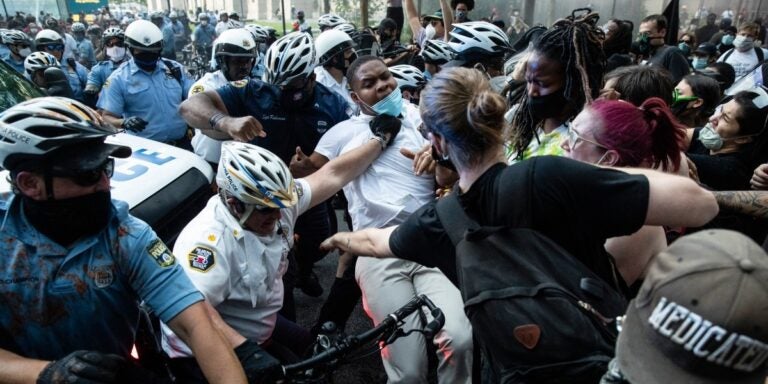Harrisburg pols want to blow up union hearings that can shield bad cops
A bipartisan group of Pa. lawmakers are drafting legislation that could gut the system that makes it difficult to get bad police off the beat.

Police and protesters clash Saturday, May 30, 2020, in Philadelphia, during a demonstration over the death of George Floyd. Protests were held throughout the country over the death of Floyd, a black man who died after being restrained by Minneapolis police officers on May 25. (AP Photo/Matt Rourke)
A bipartisan group of Pennsylvania lawmakers are drafting legislation that could gut the state’s police union arbitration process –– a system that sometimes lets fired police win back their jobs.
In Pa., half-century old legislation known as Act 111 bars emergency personnel from striking but enshrines the right of the police and fire unions to otherwise collectively bargain over processes like internal discipline.
In many places, like Philadelphia, the union has won the right to appeal disciplinary actions or dismissals through binding arbitration –– a system that has sometimes reversed firings of police that investigators concluded were guilty of misconduct.
Philadelphia state Rep. Donna Bullock says she is in the process of drafting legislation to, at minimum, add transparency to a process of secretive arbitration hearings with case files that are typically heavily redacted and private arbitrators whose identities are rarely disclosed.
But Bullock said talks were also underway to do away with arbitration panels altogether, effectively making police at-will employees.
“Adding transparency in the process would be a first step,” the state rep for the 195th House District said. “But if we could completely remove the arbitration process, that would be part of my goal. That is the ultimate goal.”
Pa. legislators have proposed similar changes in the past, but prior efforts withered under heavy criticism from the Fraternal Order of Police, the union that represents law enforcement. FOP, which represents some 40,000 officers at roughly 1,100 police departments across Pa., cast these bills as an effort to undermine unions, expose officers to frivolous complaints or supervisory abuse.
“You’re making officers subject to all the prejudices subject to at-will employment,” Pa. FOP President Les Neri said. “You write Joe Schmoe a ticket, you could get fired.”
Bullock said this time might be different, with a surge of political will to reform local law enforcement following the death of George Floyd at the hands of police in Minneapolis and ensuing protests.
“When it puts lives of Black and brown communities at risk, we need to be more aggressive about how we handle police misconduct and discipline,” she said. “It’s a really strong position, but it’s one that needs to be taken.”
How corrupt cops get their jobs back
Civil rights attorney David Rudovsky, who has sued the Philadelphia Police Department over police misconduct, said arbitration panels to resolve disputes over wages or benefits were hardly eyebrow raising in ordinary collective bargaining contracts. But he said the sticking point came when law enforcement unions used this process to override or reverse disciplinary actions taken by the department’s own Internal Affairs process.
Unlike ordinary appeals, union arbitrations saw new evidence introduced, old evidence thrown out, effectively granting rank-and-file police “super due process,” Rudovsky said.
“In the criminal process, the burden is on you to prove something went wrong, that you didn’t get a fair trial. You don’t get to reargue those facts,” the lawyer said. “Instead, this system is ultra-fair to police…The burden ought to be on the officer at that point to show that they didn’t get due process the first time around.”
The arbitration process has repeatedly gotten Philadelphia police put back on the city’s force, even when the commissioner sought to dump them.
In one instance, an infamous narcotics unit was accused of beating, robbing and kidnapping suspected drug dealers, while stealing over a half million in street money and drugs. Although the group was acquitted of criminal charges in 2015, former Commissioner Charles Ramsey still concluded there was enough evidence to fire the six men, pledging to “melt their badges.”
Instead, an arbitration panel reversed the firings. One of the accused officers, Perry Betts, was fired shortly after failing a drug test.
Another Philadelphia officer, Michael Paige, was fired in 2007 after being arrested for allegedly forcing a man to perform oral sex on him while on duty. The officer already had a long track record –– sleeping on the job, allegations of theft, past refusals to cooperate with Internal Affairs –– but he too won back his job back through arbitration. The panel concluded that although the sex act had occurred, there wasn’t enough evidence to conclude it was forced.
There are still others. A police lieutenant taped slapping a woman at a 2013 parade. An officer fired in 2015 after shooting three men over three years while on duty. An officer fired in 2018 after being found guilty by IA of soliciting a sex worker.
All got their jobs back through the grievance arbitration process written into the police’s union contract. The Inquirer reported in 2019 that these hearings had resulted in reduced or overturned police discipline about 70% of the time.
Critics, like Rudovsky, say the department’s own internal processes –– before misconduct allegations ever reach arbitration –– is already weighted in favor of officers. Internal Affairs rejects or downgrades the vast majority of complaints leveled at police, and officers receive secondary review from the Police Board of Inquiry before action is taken.
“There are many levels of internal review, before termination or other forms of serious discipline,” he said.
Legislation would focus narrowly on law enforcement
The union process troubles Republicans too, some of whom are now seeking changes. On Tuesday, GOP state Rep. Russ Diamond circulated a cosponsorship memo indicating intent to overhaul Act 111.
The proposal would effectively revive legislation he floated in 2017 that quickly fizzled in the face of FOP opposition.
But Bullock said she was in discussions with Diamond about possibly combining their efforts into a single, bipartisan piece of legislation. And Diamond, too, said this time might be different.
“We do have to get consensus on this. Consensus from conservatives on the union contract negotiation side, consensus from good government groups, consensus from the Philadelphia delegation, where this issue is particularly a problem,” he said.
Diamond’s proposal would bar unions from seeking arbitration for officers that had committed a criminal offense, used force illegally or in violation of departmental policy, or violated “the constitutional rights of any person.”
However, some have cast a leery eye on Republican efforts to alter collective bargaining, as right-wing groups have repeatedly sought to erode the power of public sector unions. Diamond said his legislation would be narrowly focused on law enforcement –– at least for now.
“I think this could be a good model to move forward with for other government employees unions,” he said.
Neri shot back that officers that are convicted of most serious crimes are barred from service. He contended that the arbitration process is a simple third-party review of decisions that can have serious ramifications for police officers.
“They act in the capacity of a referee. They’re not union, not management,” he said. “Can a case get by? I guess. But it’s an independent citizen that reviews the facts. I don’t know what’s not fair about that, unless someone just doesn’t like the outcome.”
A spokesperson for the Philadelphia FOP declined to comment.
Although a raft of more far reaching police reform bills are set to sweep Harrisburg next week, it’s still unclear if legislation could pass a chamber that has often deferred to police unions in the past.
But even though city officials, including Mayor Jim Kenney, have been quick to blame Act 111 for tying their hands, experts like Rudovsky said the city should have been doing more than waiting for a legislative solution. He faulted figures like Kenney for repeatedly negotiating police contracts that gave away pay increases with virtually no concessions on the disciplinary issues that had dogged the department for decades.
The question is why dont they try to bargain for a different type of arbitration process. You say ‘We’ll give you that raise but you have to give up the process that forces us to retain officers that are problems for the department,’” Rudovsky said. “For years they’ve said it’s because the FOP is too powerful. But I’m not sure if that’s true.”
WHYY is your source for fact-based, in-depth journalism and information. As a nonprofit organization, we rely on financial support from readers like you. Please give today.




